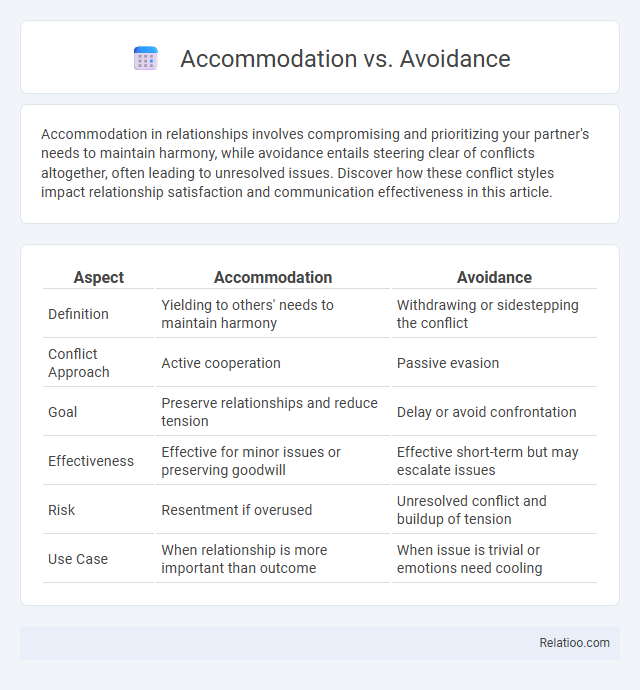Accommodation in relationships involves compromising and prioritizing your partner's needs to maintain harmony, while avoidance entails steering clear of conflicts altogether, often leading to unresolved issues. Discover how these conflict styles impact relationship satisfaction and communication effectiveness in this article.
Table of Comparison
| Aspect | Accommodation | Avoidance |
|---|---|---|
| Definition | Yielding to others' needs to maintain harmony | Withdrawing or sidestepping the conflict |
| Conflict Approach | Active cooperation | Passive evasion |
| Goal | Preserve relationships and reduce tension | Delay or avoid confrontation |
| Effectiveness | Effective for minor issues or preserving goodwill | Effective short-term but may escalate issues |
| Risk | Resentment if overused | Unresolved conflict and buildup of tension |
| Use Case | When relationship is more important than outcome | When issue is trivial or emotions need cooling |
Understanding Accommodation and Avoidance
Accommodation involves adjusting your behavior or environment to reduce conflict or stress, often by compromising or yielding to others' preferences. Avoidance, in contrast, means deliberately steering clear of certain situations or decisions to prevent discomfort or confrontation, which can delay resolution and escalate tension over time. Understanding the nuances between accommodation and avoidance helps you develop more effective coping strategies for managing interpersonal challenges.
Core Differences Between Accommodation and Avoidance
Accommodation involves adjusting your behavior to meet others' needs or preferences, often to maintain harmony or avoid conflict. Avoidance, on the other hand, entails steering clear of addressing issues or interactions altogether, which can result in unresolved tensions. Sensitivity influences how you perceive and react to others, affecting whether you lean towards accommodation or avoidance in social situations.
Psychological Foundations of Each Strategy
Accommodation involves adapting one's behavior to align with others, rooted in cognitive flexibility and social harmony principles. Avoidance reflects a defense mechanism aimed at reducing emotional distress by steering clear of threatening stimuli, often linked to anxiety regulation. Sensitivity denotes heightened perceptual and emotional responsiveness, grounded in neural pathways that amplify awareness of environmental and interpersonal cues.
Pros and Cons of Accommodation
Accommodation in conflict resolution promotes harmony by prioritizing others' needs, which strengthens relationships and fosters cooperation. However, excessive accommodation can lead to resentment, unaddressed personal needs, and potential exploitation. Balancing accommodation with assertiveness ensures that both parties' interests are respected without sacrificing individual well-being.
Pros and Cons of Avoidance
Avoidance as a conflict management style helps minimize immediate stress by preventing direct confrontation, which can be useful in situations where emotions are high or the issue is trivial. However, relying too heavily on Avoidance may lead to unresolved problems, increased tension over time, and missed opportunities for growth or compromise in your relationships. Balancing When and how you use Avoidance versus more proactive approaches like Accommodation or Sensitivity is crucial for healthy communication and long-term conflict resolution.
Accommodation vs Avoidance in Conflict Resolution
Accommodation in conflict resolution involves prioritizing the other party's needs over your own to maintain harmony, often by yielding or giving in. Avoidance, on the other hand, means deliberately ignoring or withdrawing from the conflict, delaying resolution and potentially escalating tensions. Understanding when to use accommodation instead of avoidance can help you manage disputes effectively by fostering cooperation rather than neglecting the issues at hand.
Impact on Mental Health and Wellbeing
Accommodation involves adjusting behaviors or environments to reduce stress, promoting mental health by fostering a sense of control and safety. Avoidance, while providing short-term relief from anxiety, can exacerbate mental health issues by preventing necessary coping and adaptation. Sensitivity heightens emotional reactions to stimuli, potentially increasing vulnerability to stress, but awareness of this trait can help you implement strategies to enhance wellbeing.
Practical Examples in Everyday Life
Accommodation involves adjusting your behavior to fit social norms, such as lowering your voice in a library to respect others. Avoidance means steering clear of situations that trigger discomfort, like skipping a crowded party if you experience social anxiety. Sensitivity reflects heightened awareness to stimuli, evident when you notice subtle changes in a colleague's tone or mood, helping you respond more empathetically.
When to Choose Accommodation or Avoidance
Accommodation suits situations where preserving harmony and relationships is more valuable than winning, often during minor conflicts or when the other party has a stronger position. Avoidance is appropriate when the issue is trivial, emotions are running high, or more information is needed before addressing the problem. Choosing accommodation or avoidance depends on factors like conflict importance, urgency, and the potential impact on long-term collaboration and mutual respect.
Strategies for Healthy Coping and Decision-Making
Accommodation involves adapting to stressors by modifying expectations or behaviors, promoting flexibility and resilience in coping. Avoidance strategies temporarily reduce discomfort by evading stress-inducing situations but may impede long-term emotional processing and decision-making efficacy. Sensitivity to triggers requires mindful awareness and emotional regulation techniques, enabling constructive responses and healthier decision-making outcomes.

Infographic: Accommodation vs Avoidance
 relatioo.com
relatioo.com